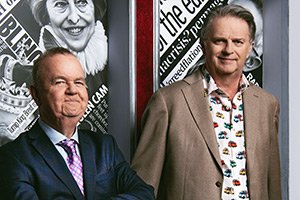The HIGNFY Writing Team interview
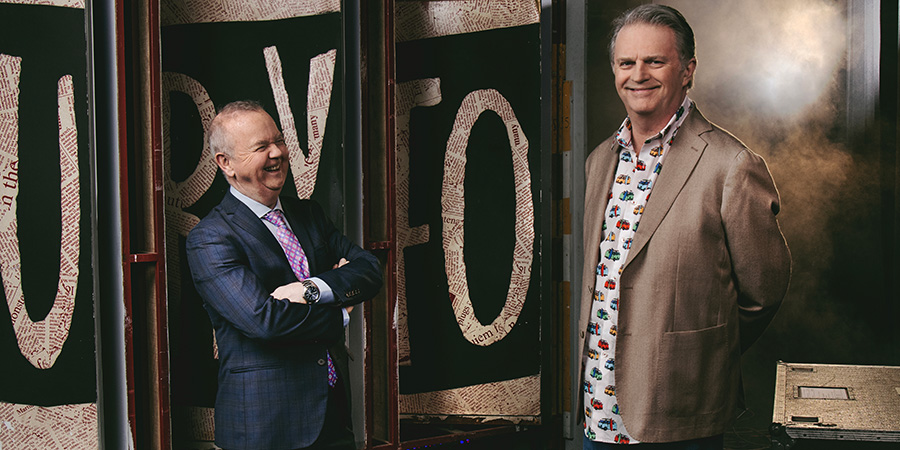
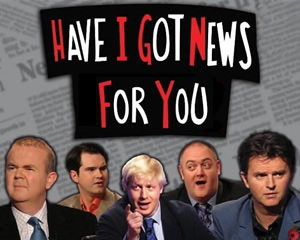
Have I Got News For You doesn't really need an introduction - it's Britain's most popular TV panel show, attracting audiences of over 8 million each week. Although comedy fans are very familiar with what goes on in front of the HIGNFY cameras, it is surprising how few people also know what goes on behind-the-scenes at the Hat Trick produced show. Determined to change this situation, a couple of years ago British Comedy Guide set out to find out more about the writing team...
The first thing to know is that the show was initally written by host Angus Deayton and the show's producer, the late Harry Thompson. However, as the programme started to grow in popularity (Series 4 to be exact) more writers were brought in...
Mark Burton and John O'Farrell were the first to join the show. Mark is now best known for co-scripting Hollywood blockbuster Madagascar and the last Wallace and Gromit movie, but he still writes for HIGNFY from time-to-time. Meanwhile John is now a very successful novelist (May Contain Nuts is one of his books).
At present, including Mark, there are nine Have I Got News For You writers. Pete Sinclair is one of them; readers might recognise his name as being Jack Dee's co-writer on Lead Balloon. Also on the writing team is Colin Swash, who produced HIGNFY for a number of years; Rob Colley, Ged Parsons, Dan Gaster and Simon Blackwell - a bunch of guys who write across the spectrum of panel shows and light entertainment programmes from Graham Norton to Strictly Come Dancing and everything in between (Simon also works on The Thick Of It). Finally there's the two 'new boys', Dave Cohen and Kevin Day, who started as stand-ups and came more recently to writing.
Mark, Colin, Ged, Simon and Dave kindly took time out of writing duties on Series 34 of HIGNFY (2007) to explain more about the show and answer some of our readers' questions...
Thanks for talking to us guys. How did you get into comedy writing?
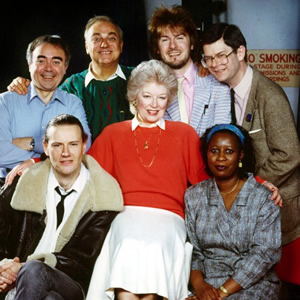
Simon Blackwell: The News Huddlines (pictured) and Week Ending on the radio. I started writing relatively late (in my thirties) and just caught the tail end of Week Ending, in the days when you could just wander into Broadcasting House for the non-commissioned writers' meeting and weren't met with the strip-search security they have there now.
Dave Cohen: I became a stand-up in 1983, the perfect time to start. All the people associated with The Comic Strip and The Young Ones had left to go to telly, so there were a whole bunch of clubs and no-one to play them. Also there was a topical radio show called Week Ending, which was the main way in to the business. The BBC still runs new radio sketch shows from time to time, but Week Ending was on 40 weeks a year. It really was an industry and most of the HIGNFY writing team cut their teeth there.
Mark Burton: I started going to the non' com' writers meetings at Week Ending (Light Entertainment Radio) - also a topical stage show called Newsrevue.
Ged Parsons: I wrote bits for school magazines, and college mags at Uni. Around the end of 1985 I got fired from/quit a normal job in advertising research (shudder!), and saw an article in one of the Sundays a week later, about the BBC 'Comedy Corridor' (as was), and how any fool with a joke could walk in and contribute to Week Ending. Being a fool with a joke, that's what I did. I ended up doing 4 years on Week Ending and an alarming 10 years on The News Huddlines, with 2 off for good behaviour.
And how did you become involved in writing for HIGNFY then?
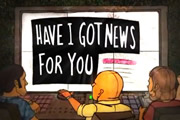
Mark Burton: The original producer Harry Thompson (who died in 2005) brought me and John in to bump up the gag rate around series 4.
Ged Parsons: When John O'Farrell left to start writing the first of his thousand books, there was a gap on the team. Richard Wilson, with whom I'd worked a lot in radio, asked several people to come in and write for a trial day - I was one, and I was then lucky enough to be offered the place. That was in 1997, series 15.
Dave Cohen: I'd written for various topical shows with one of the producers (Nick Martin). I think I'd been on a list for a while, someone dropped out and I got rung up asking if I could come in for a day. That was about six years ago and I still haven't been found out.
Simon Blackwell: You find your way onto a list, I think, via recommendations from producers or writers who've worked with you elsewhere. Then you get a couple of trial writing days, before which you feel nervous as hell, and see how it works out.
Do you think having a background in stand-up comedy helps?
Dave Cohen: Yes and no, he answered helpfully. Yes, because years of standing in front of an audience teaches you the quickest route to the punchline. No because I'd shout things out in the writers' room which I knew would be funny if it was me saying them in my act, but wouldn't necessarily work for someone else. It took me a while to learn how a writer constructs a joke. Kevin and I always did a lot of topical stuff. We started a show at the Comedy Store called The Cutting Edge, and used to do a lot of topical panel shows on the radio. So that helped.
What parts of the show do you write? Do you ever 'help out' Ian, Paul or any of the guest panellists with pre-prepared gags?
The chairman's script is all that we write. That includes the film footage at the start and the pictures at the end. The producers write all the follow-up questions within the rounds, sometimes adding our jokes, often coming up with jokes of their own. We never write a word for anyone else.
A good guest will, of course, have kept up with the news that week, and will have probably thought of a few funny things to say about the stories.
Could you describe an average week?
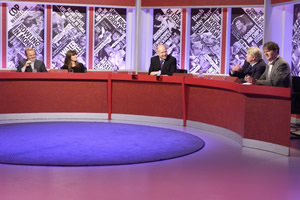
Most of the show is written on the Tuesday and Wednesday. Tuesday is mainly odd ones out (or is that odd one outs?), Missing Words, and the odd news story. Wednesday is Rounds 1 and 2. Three writers each day. On Thursday one writer is on hand for re-writes or if a big story breaks. There's a few writing days before the series starts for picture captions and VT gags.
We're given the story (or odd one out) and handed pages of notes from the researchers. We then read through it all, shout out if we think of a gag off the back of the research, and if the other two laugh it'll get typed onto the page in note form. Generally we like to send the producers at least four gags per odd one out picture, eight per news story and two or three per missing word. Once we feel like we've got enough gags we start wording them up. Some will fall by the wayside, others will be improved, and if we're lucky some new really funny ones will emerge.
Simon Blackwell: I think the researchers need to get a mention here - everything you need to know about a story will be in the huge pack that the researchers give you on a writing day. You could spend the rest of the week reading comics and you'd still know enough about a story from the researchers' packs to write about it.
It must be hard to keep up with the news?
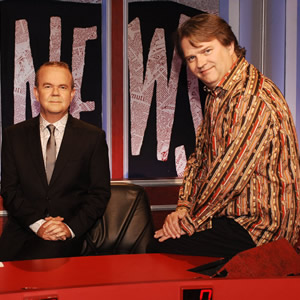
Dave Cohen: You develop a weird attitude to news, after a while you only properly read stories that you can make jokes out of. Most people start reading a huge story, like the assassination attempt on Benazir Bhutto, and say 'that's really awful', comedy writers will say 'hmm, no gags here I think.'
You'd be amazed how much stuff we write that doesn't get used. There are so many things that make HIGNFY such a successful show - Paul, Ian, the chemistry with the guests and the chairman, the ad libbed moments, the interesting revelations, the speed-editing - the chairman's script is just one factor. We're not complaining, it's a great show to be a part of, but we accept that we have to write loads more than is needed.
Ged Parsons: HIGNFY has always had a brilliant production team, and even keeps on a permanent core of researchers, who are compiling stories, pictures and clips all year round, which doesn't tend to happen on other similar shows. So, you don't really have to watch the news more than you would ordinarily - though, in the end, you probably do. Same with the papers, you probably look through several every day. As for material, you very quickly get used to about 70% of the jokes the team has come up with not being used - it's a shock the first week, but then it becomes the norm.
We love the captioned pictures at the start and end. Where do they come from?
The clips come from all the sources that TV companies get clips from. And the more obvious sources on the net. Of course when the show started there was no cable TV, no internet, no YouTube - just the four channels.
In addition the massively hard-working research team spend hours watching re-runs of Newsnight, Question Time and the like, in search of comedic gems. Lucky sods. That's when they're not poring over every single daily newspaper in the search for a photo that might elicit a decent caption.
Are you ever biased towards your personal political opinions when selecting targets to satirise?
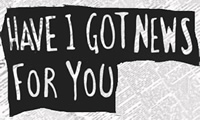
Dave Cohen: Not in selecting them. People like George W Bush select themselves. But one can't help one's own prejudices shining through - although as soon as those opinions cease to be funny they tend not to find their way into the script.
Ged Parsons: I think satire should always be rooted in common sense. And I believe we should always have a dig at the Government (whoever it is) slightly more often than at the Opposition, because whichever party's in power is the one that's messing things up.
Some of the best jokes on the show must make the lawyers sweat! Do they cut much?
Dave Cohen: Among its many achievements, HIGNFY has re-defined the rules for what you can and cannot get away with. They sailed so close to the wind for so long without getting sued thanks to a team of lawyers who believed in what the show was trying to achieve.
Colin Swash: A Hat Trick lawyer and a BBC lawyer read script before the recording so some jokes get cut or fought over then. Straight after the show the producer goes to the lawyers and says no problems there eh?
Every so often the lawyers will say we'll talk tomorrow
- then they'll see the first edit, and barter from there.
A few people have said HIGNFY is a bit 'stale' because, 17 years on, the format is un-changed and Mock the Week and other topical shows have now appeared offering a new take on things. Is that fair criticism?

Dave Cohen: Well they're right, the format hasn't changed, but then why should it? Sixteen years on, the show is still pulling in 8 million viewers, it's still funny and it still makes waves beyond our little world. For ten years everyone has been saying the old format of filming a sitcom in a studio with five cameras and an audience is over. Then along come The IT Crowd and Not Going Out and you realise it's nothing to do with the format, just what you do with it.
As for stale, obviously that's a matter of opinion. People will always say it was better in the old days
but anyone who saw the episode in the last series about the Cutty Sark catching fire will be aware the show remains as fresh as ever. Also, you could argue that Mock the Week host Dara O'Briain and 8 Out of 10 Cats host Jimmy Carr learned their jobs by guest hosting HIGNFY.
Ged Parsons: There aren't that many ways you can format a topical satirical news quiz - I think I prefer a word like 'iconic' rather than 'stale'! As for other shows, the formats may differ, but a lot of the writers are the same.
How many more series do you think HIGNFY has got in it?
Dave Cohen: As long as it still feels fresh, still gets an audience, still shocks, there's no reason why it can't keep going.
Ged Parsons: If Ian and/or Paul ever wanted to stop, I'd imagine it would probably end then, and come back shortly afterwards under a new name. But I reckon it'll be around for a good while yet. I'm told the third screening the BBC has started showing this series has added nearly 3 million to the viewing figures, so people obviously still like watching it.
Who has been your personal favourite guest host so far?
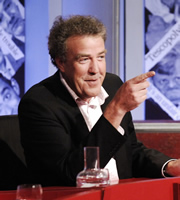
Dave Cohen: Boris, for all the wrong reasons. When Boris is in a room, comedy happens. Which is why I pray he doesn't become Mayor of London. Alexander Armstrong always feels exactly right.
Colin Swash: Boris. (grumps) just the once.
Simon Blackwell: Alexander Armstrong, Dara O'Briain and Michael Aspel.
Ged Parsons: Jeremy Clarkson (pictured), Jack Dee, Dara O'Briain all have an annoyed, sarky edge, which I like. Bruce Forsyth because it was so extreme, and one-off. Boris, but he mustn't be overplayed.
At what point do you get to know who the guest host is?
Often we find out on the day we come in to write. If it's someone who has done it before who clearly knows what they're doing we more or less don't think about it. If it's a professional newsreader we try a little bit to write in the style people are most familiar hearing them. If it's someone who brings something unique to the chair (e.g. Damian Lewis) we'll throw in the odd gag that plays on who they are. If it's Boris you shrug your shoulders, sit back and watch him mangle the words into Boris-speak.
Why did you do so many 'Prescott is fat' jokes?
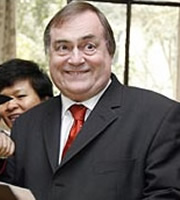
Because...
1. At the time we didn't know he was also a shagger!
2. We felt it our duty to point up the hypocrisy of a government instructing us how to eat and get healthy when its own Deputy Prime Minister couldn't be bothered to set an example.
3. It was funny.
4. He is fat.
Ged Parsons: I've got big bones, too, so I'm allowed to do 'big-boned' jokes.
Who do you have to sleep with to work on the show?
Dave Cohen: Well as Angus discovered, probably best not to sleep with anyone.
Ged Parsons: John McCririck. We tend to find that lowers the number of writers who are after our jobs.
We have a lot of aspiring writers on our website. Do you have any tips for them?
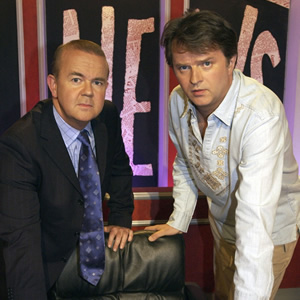
Dave Cohen: No, we're too busy jealously guarding what work there is. Sorry, no room for new people. Oh if you insist... I suggest you start sending gags to Radio 4 topical comedy shows. They probably won't get used, or you might here something similar go out that was written by a commissioned writer - but if your jokes are funny enough, and you keep sending them, someone will spot them, and you may get contacted, possibly receive a commission, then take it from there.
Simon Blackwell: There seems to be a shortage of gag writers at the moment - i.e. people who just want to be writers, not writer-performers (as always, there's a glut of these). So if you keep putting your stuff out there, particularly in the direction of BBC radio producers, and you're any good, eventually you'll get a break.
Ged Parsons: What Dave said - because that's more or less what most people who work on the show actually did. BBC Radio hasn't really had any 'open access' comedy shows for a while (boo!), but they've started to redress that now (hurray!).
Which broadcast gag are you most proud of?
Dave Cohen: It really is a case that you're churning out so many in the day you can't always remember who came up with what. And the producers just get sent the jokes, they have no idea who is responsible for each one. So even if I could remember a favourite gag, Ged would probably moan that it was actually him who thought of it. Having said that, my favourite joke last series was something Ged came up with about Zinedine Zidane as a kid, suffering the daily humiliation of hanging around for school dinners as the names were read out alphabetically.
Ged Parsons: (Moans) But I never moan! Actually, most of the jokes start off with one of us getting an idea, or spotting a quote, or whatever - then everyone else adds to it, hones it, and polishes it up. The writing team combination is a bit like a band - you get to know each other's style, and you can bounce ideas off each other. It's work but it's also very good fun.
Do you have any projects in the pipeline at the moment?
Colin Swash: I don't have a pipeline.
Dave Cohen: Or a project to put in it.
Mark Burton: I'm working on a Warner Brothers movie that's been described as Bourne Identity for librarians
.
All: (tut jealously at Burton behind his back)
And finally, something we ask everyone, what are your favourite comedies?
Dave Cohen: Steptoe and Son, Dad's Army, Father Ted, Ab Fab, Tommy Cooper, Steve Martin stand-up, shall I stop now? Frasier, Seinfeld, Morecambe and Wise, I'll stop now.
Mark Burton: Monty Python, apart from the cynical re-hash that is Spamalot.
Simon Blackwell: Porridge. It's perfect.
Ged Parsons: Laurel and Hardy, Keaton, Marx Bros. W C Fields, Ealing comedies, Warner Bros. cartoons, Tony Hancock, Steptoe and Son, Cook and Moore, Sellers, Monty Python, Fawlty Towers, The Likely Lads, Rising Damp, Porridge, Married With Children, Perrin, Partridge, Seinfeld, Curb Your Enthusiasm, Family Guy... shelf space is a distant memory.
New series of HIGNFY are broadcast on BBC One each April and October. Thanks to Mark, Colin, Ged, Simon and Dave for their time in answering our questions.

